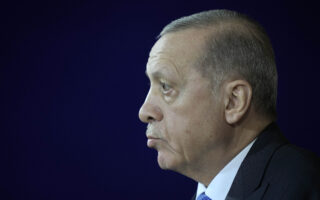US has not met its commitments, says Greek defense minister
Nikos Dendias outlines ‘new philosophy’ for strengthening deterrence capabilities, including installing missiles on Aegean islands

Washington has not met all of the commitments outlined in a letter sent by US Secretary of State Antony Blinken to Greek Prime Minister Kyriakos Mistotakis at the start of the year, Defense Minister Nikos Dendias tells Kathimerini, adding that strengthening Greece’s capabilities, so that it can “exercise its role as the reliable, stable and serious ally in the broader region,” is also in America’s best interest.
Dendias says that Athens is also exploring a “new philosophy” in its armaments programs with a more comprehensive approach that includes installing missile systems on the islands to bolster defense capabilities.
On the political front, Dendias clarifies that he has no intention of running for the Greek presidency in 2025, saying that the office should be held by a figure who enjoys “broad political and social support.”
You recently announced plans to acquire a fourth FDI frigate for the Navy. Is this the final step for strengthening its fleet?
The launch of negotiations for the fourth FDI is an important step in bolstering the country’s defenses, but it is not the only step. As demanded by any such occasion, Parliament will be briefed and the matter of commissioning its construction will be put to the Government Council for National Security (KYSEA) for approval. The fleet had been largely neglected because of the economic crisis, so certain initiatives are now essential so that it can respond to future security challenges, bearing in mind, of course, that this expenditure cannot become a “black hole.” We always need to be considerate of the Greek people’s financial struggles and the limits of the fiscal space we have. Priorities include modernizing the frigates that will stay in the fleet and beginning the missile boat and submarine upgrades. We also need to start discussing the new submarines that are needed, even if we’re talking about a horizon of 12 to 14 years. Moreover, we need to start examining a short-, medium- and long-term plan for the new surface units. Unfortunately, the American side had assured us that it would deliver reliable littoral combat ships, only to offer LCSs [from its stockpile] that had a lot of problems. We are, therefore, talking about a free concession of reliable LCSs that do not need a lot of costly work to be done to them. If we get these ships, then they will be a part of the Hellenic Navy’s surface fleet. I’d like to add that we’re not taking a piecemeal approach to the armaments programs. We are examining the role that each system needs to play. You cannot deal with the challenge of deterrence in the Aegean with warships or fighter jets alone. It also requires missile systems being installed on many of the Greek islands. This is how we can achieve complete deterrence capabilities both at sea and in the air. It is something that demands a new philosophy that also draws on the lessons being learned from the conflicts around us.
‘You cannot deal with the challenge of deterrence in the Aegean with warships or fighter jets alone. It also requires missile systems on many islands’
Where are we in terms of air defense and the creation of a “defense dome” over Greece?
We are at a very advanced stage. The planning stage has been completed and it will go into implementation following the briefing of Parliament and KYSEA’s approval. There is a comprehensive new approach to armaments – which we will be presenting – based on two main principles: ensuring deterrence in the Aegean waters and airspace and adhering to fiscal limitations, as argued both inside and outside the Armed Forces. However, the European Union also needs to understand that defense cannot be lumped together with all the other issues. The EU’s decision to exempt defense spending after the country had been put under fiscal supervision is comical. It leads to financial disaster. Interest on borrowing shoots through the roof once you come under supervision, putting a massive strain on the economy – and then the EU justifies your expenses. When the EU itself is looking for the creation of a defense arm, it cannot “penalize” the very extraordinary expenditures it says are needed.
How are discussions with the United States about its surplus materiel progressing?
To begin with, the American side needs to fulfill its commitments, as outlined in the Blinken letter to the prime minister. More specifically, it has not fulfilled them in terms of the LCSs and we still have no clear answer concerning the four C-130s [military transport aircraft]. As for the Bradley armored fighting vehicles, the ones they gave us required repairs to the tune of 8 million euros each. We also don’t know where we stand with the tanker aircraft. We are a reliable ally to the Americans and they know that. And I believe they can, therefore, choose to contribute to the goal of a technologically advanced Greece that will be one step ahead of any threat. This is not only in Greece’s interest but also in the interest of the US, so that we can exercise our role as the reliable, stable and serious ally in the broader region.
Do you believe that the Americans have short-changed Greece on occasion because of Turkey?
Not during the time that I have been a minister of this government. There is room for additional moves, however, especially in areas where there have been delays. I do not look at the issue from a confrontational point of view with Turkey. Of course, when the US supplies a NATO member with armaments, they obviously cannot be used against another member of the Alliance. The same goes for all the other countries in NATO, such as, for example, Germany.
How do you comment on the fact that Turkish officials have a habit of lashing out against you every so often?
I am among the politicians who believe that Greece and Turkey can solve their big differences – with realism but also on the specific basis of international law and the Law of the Sea. I have demonstrated as much, as the Greek foreign minister who negotiated and signed the only two maritime delimitation agreements ever in Greece’s history, with Italy and with Egypt. We had also come to a general agreement with Albania. If it had not been for the [Fredi] Beleri affair, we were within a nose of going to The Hague or settling the matter bilaterally. No one can blame me for the Turkish-Libyan memorandum and “Blue Homeland” nonsense or the blatantly illegal casus belli. If the Turks are seeking to silence me on matters that have to do with international law by attacking me personally, though, I am sorry, but I will have to disappoint them.
Do you agree with the opinion that Greek foreign policy has always been centered on Turkey?
What we need is a multilayered and multifaceted approach. There is only one issue in the Greek-Turkish dispute. It does not constitute the entirety of Greek foreign defense policy. We need to maintain an active presence in the Black Sea, the Adriatic, the Gulf, the Red Sea, North Africa and the Balkans. We cannot be absent or merely somewhat present in these areas. We cannot ignore security in the Balkans, for example. We can’t just sit by and observe Turkey’s moves in the Horn of Africa.
Propping up the military
You recently announced changes that will make admission to military academies easier. Could you elaborate on that decision?
We are facing a big problem indeed. Less than half the people the army needs were admitted to the Hellenic Army Academy this year. There is a very real risk of the Armed Forces being unable to staff themselves. So, we are focusing on two interventions. In the immediate term, we are working on improving the living conditions and pay for students at military academies. We are also improving the schools so they can offer a higher standard of education, carry out research and grant doctorates. In the long term, the only viable solution is making a career in the Armed Forces more attractive. We need a different pay scale that corresponds to the service they do for the Hellenic Republic and we need to offer a different quality of living. A military officer who is required to move with his or her family whenever and wherever the country chooses is not the same as someone who stays in the same place, in the same office for their entire career. We need to be able to offer military personnel a home and a kindergarten for their children. We need to provide for their families more. In other countries, these things are taken for granted. One of the intentions we recently announced is a special provision for military officers with a disabled family member. This entails boarding facilities and lifelong support for disabled people whose parents serve in the Armed Forces. We are also planning schools for children with autism and ensuring employment for them in the Armed Forces.
You are also planning changes to the terms of the mandatory military service.
Most young Greek men view military service as a loathsome chore. National service ought to benefit the country and the citizen – right now, it is doing neither. The standards of training are so low that the country gains nothing, while the way the service is conducted is so bad that the young person has nothing to gain from it. Both of these things need to change. We are relying on foreign models, like the Finnish one, which we will adapt. The training cycle will change, as will the skills that are taught. We have also reached out to employer organizations to gauge the needs of the market. There are labor shortages in many areas in Greece right now, like drivers for special machinery, for example. The Armed Forces can teach the skills and provide certification.

The presidency and politics
Speculation continues to be rife that you are one of the people the prime minister may put forward as the new Greek president next year. Is there any truth to these publications? Would you accept such an offer?
I am well out of this conversation, which, if nothing else, is completely out of place right now. The country has a president, as the prime minister himself has repeatedly stated. What I can say for my part, is that it is not in my intentions.
Do you think that the president should come from a different party to the ruling one?
What I believe is that the president of the Hellenic Republic needs to be a person who enjoys broad political and social support.
Much has been said and written about your relationship with Prime Minister Kyriakos Mitsotakis. How would you describe it?
It is the relationship of a prime minister with a minister of his government. Mr Mitsotakis is the one who chose me.
How do you comment on the absence from New Democracy’s recent 50th anniversary celebration of the party’s former leaders and prime ministers Kostas Karamanlis and Antonis Samaras and ex-party president Vangelis Meimarakis.
I am not at liberty to comment on that matter.





